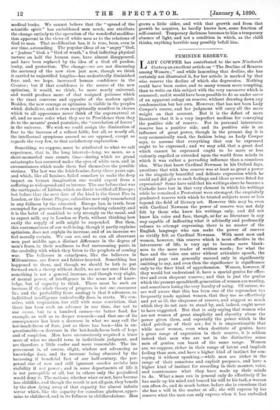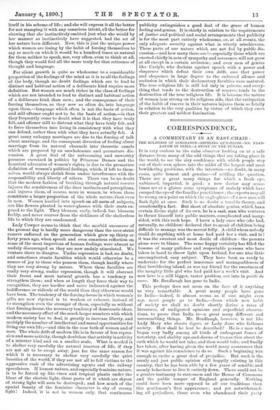FEMININE RESERVE.
TiADY COWPER has contributed to the new Nineteenth Century an excellent article on " The Decline of Reserve among Women ; " and while lamenting that decline, she has certainly not illustrated it, for her article is marked by that wise reserve the decline of which she deprecates. Nothing could have been easier, and to many women more tempting, than to write on this subject with the very nnreserve which is censured ; and it would have been possible to do so under cover of an apparent eulogy on reserve, without drawing down any condemnation but her own. However, that has not been Lady Cowper's course, and her judgment will carry all the more weight on that account. But it is the defect of mere literature that it is a very imperfect medium for conveying the positive side of reserve. For in personal intercourse reserve has a positive side, and its positive side is an influence of great power, though in the present day it is very economically used, the fashion being, as Lady Cowper says, to assume that everything that can be expressed ought to be expressed ; and we may add, that a great deal which cannot be expressed ought to be more or less violently expelled or extruded upon the world from minds in which it was rather a pervading influence than a conscious idea. Who that knew Cardinal Newman in his Oxford days, questions that with him reserve was at least as great a power as the singularly beautiful and delicate expression which he could and did give to such feelings and ideas as were fitted for expression P Some have said that his writings since he became a Catholic have lost in that very element in which his writings while he remained a Protestant were strongest, the exquisitely graduated reserve with which he treated subjects more or less beyond the field of literary art. However this may be, even with Cardinal Newman the power of reserve was not duly felt by those who knew his writings only, and did not know his voice and face, though, scs far as literature is any way capable of indicating what it advisedly and professedly refuses to attempt expressing, there is no master of the English language who can make the power of reserve so vividly felt as Cardinal Newman. With most men and women, however, this reserve which is most effective in the intercourse of life, is very apt to become mere blank- ness to the mere reader of written words ; for what the face and the voice can utter without articulate speech, the printed page can generally succeed only in significantly omitting to say, and even then the significance is significance only to the finer kind of apprehension. Women, however, if they would but understand it, have a special genius for effec- tive and even eloquent reserve ; and that is just the genius which the present spendthrift generation of women are wasting, and sometimes losing the very faculty of using. Of course, we are well aware that this has been one of the reproaches too frequently made against women, that they use so effectively and yet so ill, the eloquence of reserve, and suggest so much which they do not care to stand by, and, indeed, ought never to have suggested. But that is only saying that women who are not women of great simplicity and sincerity abuse the power given them, and especially the power which is the chief privilege of their sex ; for it is unquestionable that while most women, even when destitute of genius, have a great range of expression in their reserve, it is seldom indeed that men who are not in the distinctive sense men of genius, can boast of the same range. Women are, we suppose, richer in their range of latent and implicit feeling than men, and have a higher kind of instinct for con- veying it without speaking,—while men are richer in the range of their conscious and explicit purposes, and have a higher kind of instinct for recording in their manner, voice, and countenance what they have made nap their minds to do. What a man can in general only do effectively if he has made up his mind and braced his will to his task, a woman can often do, and do much better, before she is conscious that she has a will in the matter at all ; she will express by her reserve what the man can only express when it has embodied itself in his scheme of life; and she will express it all the better for not stamping it with any conscious intent, all the better for Ashowing that she instinctively omitted just what she would by her manner as instinctively have suggested, had the set of her nature been different. Now, this is just the unique power which women are losing by the habit of forcing themselves to say so much on which it would be a hundred times as natural for them neither to speak, nor, very often, even to think at all, though they would feel all the more truly for that reticence of thought and language.
For silent growth is quite as wholesome to a considerable proportion of the feelings of the mind as it is to all the feelings of the body, though no doubt feelings which are to lead to distinct and habitual action of a deliberate kind require more definition. But women are much richer in the class of feelings which are not intended to lead to distinct and habitual action of a deliberate kind, than men ; and the consequence of their forcing themselves, as they now so often do, into language upon them,—language which often is not the basis of action, and still oftener ought not to be the basis of action,—is that they frequently come to doubt what it is that they have truly felt, and oftener still to distrust what they have truly felt, and to force themselves into living in consistency with what they can defend, rather than with what they have actually felt. A great many unhappy marriages are due to the forcing of talk about marriage, and the consequent diversion of feeling about marriage from its natural channels into theoretic canals which are prepared by an unwholesome and premature dis- cussion. A great deal of the unbecoming and unworthy -pressure exercised in politics by Primrose Dames and the fanatical advocates of women's rights, is due to the premature definition of women's political feelings, which, if left to them- selves, would always shrink from undue interference with the responsibility and liberty of others. There can be no doubt that the modern fashion of breaking through natural reserve Injures the sensitiveness of the finer instincts and perceptions, and injures them, of course, more in women, in whom these constitute a larger proportion of the whole nature, than even in men. Women hustled into speech on all sorts of subjects, .are like flowers planted in water-glasses with their roots ex- posed to the light. They blossom early, indeed, but blossom feebly, and never recover from the sickliness of the shelterless life to which they are condemned.
Lady Cowper seems to think that the morbid unreserve of the present day is hardly more dangerous than the over-strict reserve enforced on the generation which grew up thirty or forty years ago, when speech and even conscious reflection on some of the most imperious of human feelings, were almost as unduly discouraged as they are now unduly stimulated. We venture there to disagree. Undue repression is bad, no doubt, and sometimes stunts faculties which would otherwise be a source of joy to those who possess them, though hardly where they are very strong by nature. Where these faculties are really very strong, undue repression, though it will obstruct their freest and most natural growth, has a tendency to -strengthen them; and when at length they force their way to recognition, they are hardier and more indurated against the indifference or ridicule of the world than they otherwise would have been. The tendency of the forcing-house in which women's gifts are now ripened is to weaken or exhaust, instead of to strengthen even the stronger of them, especially as without that forcing-house, the necessary tendency of democratic ideas, .and the necessary effect of the much larger numbers with which modern society has to deal, is greatly to increase liberty, and multiply the number of intellectual and moral opportunities for living our own life;—and this in the case both of women and of men. The whole drift of modern life is in favour of less repres- sion and more activity, though doubtless that activity is activity of a minuter kind and on a smaller scale. What is needed is to shelter very carefully the natural reserves of life, if they are not all to be swept away, just for the same reason for which it is necessary to shelter very carefully the quiet beauties of the world, if they are not all to fall victims to the aggressive rush of the advertising agents and the railway speculators. If human nature, and especially feminine nature, is to be forced up like vines and tropical plants under the blaze of the electric light, those parts of it which are shyest .of strong light will soon be destroyed; and how much of the special beauty of the feminine character is shy of strong light ! Indeed, it is not in women only, that continuous publicity extinguishes a good deal of the grace of human feeling and genius. It is chiefly in relation to the requirements of justice and political and social arrangements that publicity is for the most part entirely wholesome, or, at all events, the only adequate security against what is utterly mischievous. Those parts of our nature which are not fed by public dis- cussion,—and how many these are !—especially those which are exerted chiefly in acts of sympathy and reverence, will not grow at all except in a certain seclusion ; and even men of genius like Carlyle, who declaim against speech with a power and eloquence which defeat their own drift, owe that power and eloquence in large degree to the enforced silence and seclusion in which their declamatory faculties were matured. The true religious life is still led only in private, and every- thing that tends to the destruction of reserve, tends to the destruction of the true religious life. It is because the nature of women is so strong on its religious side, that the extirpation of the habit of reserve in their natures injures them so fatally in relation to the very qualities by virtue of which they exert their greatest and noblest fascination.















































 Previous page
Previous page